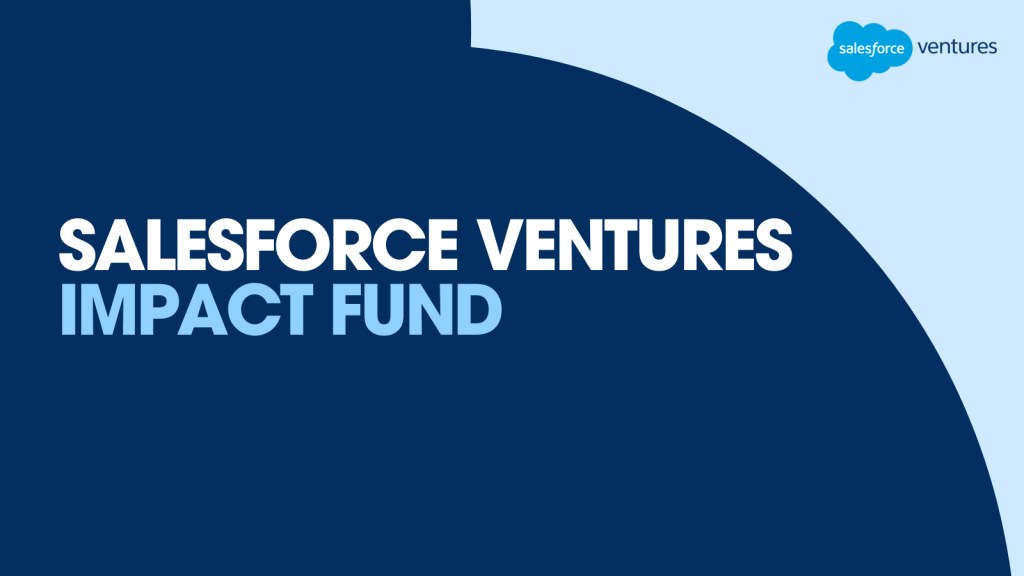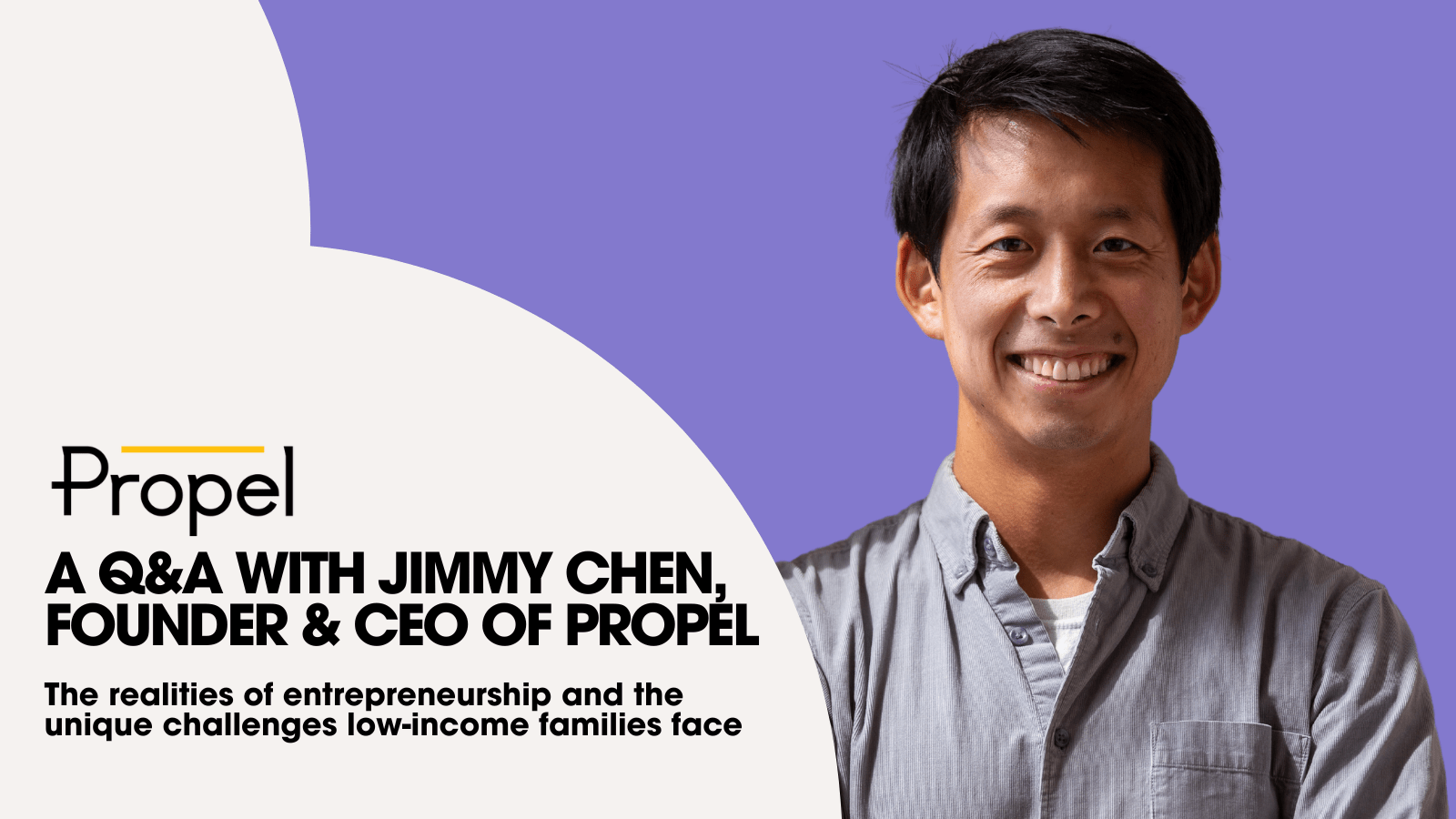Thank you Jimmy for spending some time with Salesforce Ventures. I’m excited to dive into how you built Propel, the unique challenges low-income families face, and your advice for aspiring entrepreneurs. We have a lot to cover, so let’s get started!
Enki: To kick us off, what inspired you to create Propel?
Jimmy: At the time, I had just left my role at Facebook to do a fellowship at Robin Hood Foundation’s Blue Ridge Labs. There, I started Propel on what I thought was the typical entrepreneurial path, but have since learned from my peers that my approach was unlike that of many others. I knew low-income families were the demographic I wanted to serve. From there, I sought out the customer pain-points and a business model that would scale. Typically, entrepreneurs will start with the business model or business opportunity and then back into defining the demographic they are trying to solve.
During my summer at Blue Ridge Labs, I learned about the safety net that exists for low-income families and particularly, the SNAP program, more commonly known as food stamps. Forty million Americans use this program, reaching over a hundred billion dollars in transaction volumes yearly. But with all this transaction volume, the most common way to check balances on an EBT card, the debit card used to distribute SNAP benefits, is to call a 1-800 number. I wanted to build a modern way to help people better leverage the safety net available to them.
Enki: For those not familiar, can you share a bit more about what Propel is doing today?
Jimmy: Out of the prototype at Blue Ridge Labs, we built The Providers App, a free smartphone app that helps low-income families make it through each month. Initially, the app started as a way for individuals to easily check their EBT balance and transaction history. We’ve also partnered with external providers to help users save money on their home, internet, and cell service. Through the app, our users can find ways to earn additional income, focused on the needs and opportunities of low-income families, such as on-demand work, part-time or full-time work, seasonal jobs, and even further training opportunities.
We have also expanded our product suite and now offer the Providers card, a debit card and checking account, built from the ground up to meet the needs of low-income families. The Providers card enables users to get their government direct deposits or cash benefits including tax refunds, social security, disability income, and unemployment benefits.The Providers card offers users a modern, first-class checking account with all the bells and whistles one would expect from a popular consumer neo-bank and enables users to feel financially prepared every month.
Enki: One key aspect of Propel that we, as impact investors, are particularly keen on is the fact that you are building technology for low-income Americans. We know this demographic pays more in fees and penalties than others. Knowing this, how do you ensure you are a trusted and equal partner for those you are serving, rather than adding on to these metrics?
Jimmy: It’s something I have spent a lot of time reflecting on. Other products are typically serving low-income families through channels or B2B partnerships. At Propel, we go directly to the consumer and own the relationship with the family. On average, our users earn $12K a year, and leveraging the safety net is critical to their well-being, and as such, they have a specific set of financial needs that differ from those of middle-class families. Building trust with our users is the baseline for Propel. These families are distrustful of financial services, often for good reasons. Low-income families are continuously taken advantage of by having exorbitant fees levied on them, predatory lenders, or check cashers. We’ve built trust by making good on what we have promised, day in and out. We’ll maintain that trust by consistently serving our users’ best interests. To this effect, we ensure advertisements on our app only help put dollars into our users’ pockets and we screen out anything predatory. We also run checks to confirm our debit card is structured in a way that it’s aligned with financial health. While these seem like mundane operating choices, this is what ultimately builds trust in the long term.
Enki: We are living in a challenging macroeconomic environment, one that is undeniably impacting low-income families. What key challenges do your customers uniquely face?
Jimmy: First, I want to highlight a near term impact to low-income families that has not gotten nearly enough media attention, the end of the Emergency Allotments for SNAP program, started during the pandemic, that will end across the country in February and March 2023. Five million of our six million users will be affected by the end of this program, which will lower the amount distributed for SNAP benefits by tens of billions of dollars per year and ultimately lead to further food insecurity and lost purchasing power. We’ve written an in-depth report on these impacts to continue educating our users and our partners about the impacts they will face. We’ve also published a report on our website to help inform our readers about the financial status of low-income families.
While economic shocks are hard to avoid, we do have a publicly funded safety net in this country, to help bridge the gaps when needed. The problem is that the technology used to power the safety programs has fallen behind dramatically. Our role at Propel is to strengthen the technology of safety net programs so individuals can receive the benefits they qualify for, with as little effort and as little shame as possible, to obtain the maximum impacts possible.
Enki: Well said, and it will be a critical time to help bolster the demographic you are working with. When we think about macroeconomic shocks, we often tell individuals that this is the best time to become an entrepreneur. What is your take on this sentiment?
Jimmy: There are harder and easier times to start a company from both a capital and talent perspective. However, many of the most successful founders I have met did not let macro factors influence their drive. If you are an incredibly motivated founder, you will succeed – whether you start your company in a good market, a bad market, or anything in-between. Being an entrepreneur is hard in any market, and which is why you need to be incredibly passionate about what you are building. This passion is what will drive the success of your company.
I would also be remiss to not share some realities of being an entrepreneur. When I started Propel, I was single and did not have a lot of personal burn. It was a phase of my life where I could take on the risk of not having health insurance or a paycheck. I was lucky I could take the financial risk, but it’s worth acknowledging that few people can take this risk.
Enki: What advice would you give to aspiring entrepreneurs as they are starting to contemplate what types of companies they want to build?
Jimmy: There is a natural tendency, in consumer software especially, to solve the problems you know best and invest in the areas you personally understand. This is only natural, and we are all human, but going too far in this direction creates biases and leads people to miss major business opportunities.
I welcome aspiring entrepreneurs to think about demographics that are not like themselves, and understand the vast business opportunity that lies in front of them. There are many challenges that software could solve, but few individuals with the lived experiences and means to build these companies. I say, spend a day in the shoes of a low-income individual who trusts you and who you trust. Write down your observations of the ways their experiences are suboptimal.
This also goes for investors, we need more investors to see the significant fundamental business advantages impact driven companies have, like great employee retention and hiring, operating in spaces that others are not, support from the public sector, and media opportunities.
Thank you Jimmy for your great insights. We’re honored to support Propel through the Impact Fund!







